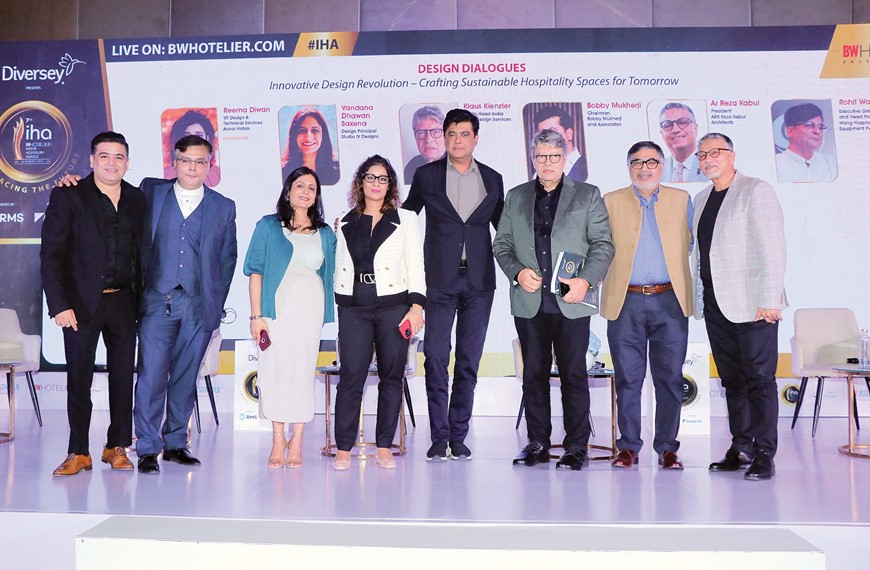“To ensure sustainability, the need of the hour is to create a design that is timeless,” declared design experts gathered at the 7th edition of the BW Hotelier Indian Hospitality Summit and Awards, emphasising the importance of innovative designs that stand the test of time, not just for the next decade but for the next 50 to 100 years. The session’s moderator, Reema Diwan, Vice President of Design and Technical Services at Accor Hotels, was in discussion with Bobby Mukherji, Chairman of Bobby Mukherji and Associates; Rohit Wangnoo, Executive Director of Wang Hospitality Equipment; Vandana Dhawan Saxena, Design Principal of Studio IV Designs; Ar Reza Kabul, President of ARK Reza Kabul Architects and Klaus Kienzler, Studio Head India, Hyatt Design Services. Sustainability, as they highlighted, goes hand in hand with minimising carbon footprints.
Mukherji elucidated this symbiotic relationship, saying, “It starts with being as Indian as possible. Indians know the material; they understand the weather, geography, limitations of a good project, and getting the best out of Indian artisans. Locally made is the key.
” His approach, founded on utilising the knowledge and expertise of local artisans and materials, is seen as a key driver for sustainability. He added, “Try and create a product that is timeless, and you can reduce the carbon footprints to a good extent. ” Diwan recognised the historical thread of sustainability in India.
She pointed out that India has a tradition of sustainable practices, from using paper bags to small, eco-friendly initiatives. However, in the quest for modernisation, the country somewhat lost touch with its eco-conscious roots, a situation that is now undergoing a change. In fact, this vision is already becoming a reality in places like Morbi, Gujarat.
Wangnoo showcased Morbi as a prime example of this transformation. Morbi has evolved into the ceramic capital of India, with nearly 390 factories. Today, Morbi’s tiles not only match Italian quality but are also cheaper than the Chinese imports.
This transformation has even piqued the interest of European companies looking to collaborate with Morbi’s businesses. Saxena highlighted the importance of long-lasting materials in sustainable interior design. She noted that “properties often undergo refurbishments every five years.
So, the treatment of hotels and properties as material banks, where everything removed can be reused or recycled, is the key. ” Efficiency, she argued, is the key to sustainability in today’s world. Kabul drove this point home, stating, “When we design anything, we have to keep in mind we are designing for the future.
You need to design something that can be converted. That is the best way to design. ” But not all experts shared the same perspective.
Kienzler emphasised the importance of adaptation and evolution. He noted that hotels need to evolve to cater to the changing needs and desires of their clientele. “The more senior and corporate people travelling will have an impact on the design,” he explained.
“The generation that has the money to spend wants to explore other cultures. The hotels need to check on the demand and the need. ” This article was published in BW hotelier issue dated ” with cover story titled ‘BW HOTELIER IHA 2023 SPECIAL’.
From: bwhotelier_businessworld
URL: http://bwhotelier.businessworld.in/article/Sustainability-starts-with-being-typically-Indian/15-01-2024-506063



